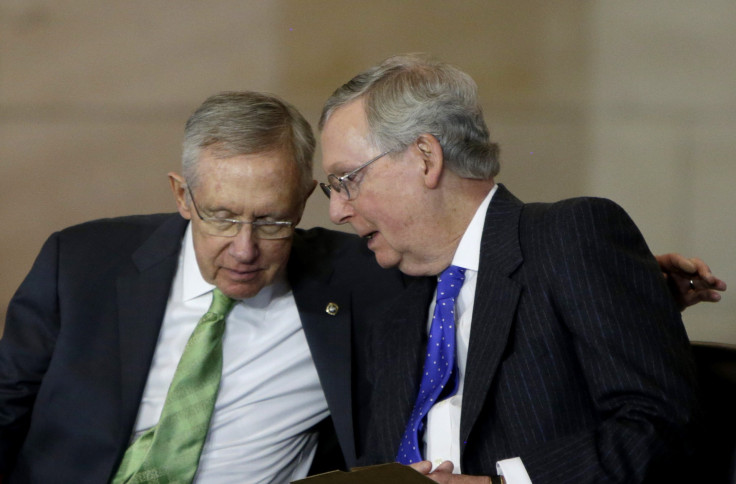Shutdown 2014: Senate Deadline Extended To Pass $1.1T Spending Bill

WASHINGTON – The Senate appears to have hit a speed bump in its efforts to quickly pass a $1.1 trillion spending bill. The deadline for passage got another extension, giving the Senate until Wednesday to continue debate on the bill.
The extended deadline gives senators time to push back -- if only symbolically -- at provisions they dislike in the legislation. Conservative Republicans are unhappy the so-called cromnibus bill doesn’t go after President Barack Obama’s executive orders on immigration. Liberal members are unhappy the bill rolls back regulations on Wall Street that were included in the Dodd-Frank law.
Senate Majority Leader Harry Reid and Minority Leader Mitch McConnell worked Friday to try to find a deal that would allow them to pass the bill and head home. But sticking points over other appointments and legislation -- tax break extensions and a terrorism insurance program -- made it impossible to find a compromise and vote on the spending bill Friday. They will return next week to finish their work, thanks to a deadline extension.
"I hope we can work something out to get this done tonight," Reid said Friday evening. "I would hope that cooler heads would prevail. There is no sense in our waiting around."
Sens. Elizabeth Warren and David Vitter -- two members about as far apart on the political spectrum as possible -- filed an amendment to eliminate a rollback of Wall Street regulations that was included in the bill. The effort is unlikely to be successful, unless the goal is to make the Senate work through the weekend.
Warren, D-Mass., has been one of the key figures pushing to strip the Wall Street regulation provisions from the bill. Republicans negotiated to insert the provision, which would continue taxpayer-supported guarantees for the derivative swaps that critics say contributed to the 2008 financial collapse. Some Wall Street-friendly Democrats have also long supported the measure. Warren and other economic populists in the Democratic Party argue that banks should have to cover their riskiest bets themselves. Vitter objects to the government bailing out banks at all.
It’s still unlikely that any senator is going to succeed in changing the bill. Doing so would create chaos, especially since the House adjourned late Thursday after passing the cromnibus and has headed home for the holidays. Amendments require approval from leadership, and there's no motivation for Reid to allow it.
It also remains highly unlikely that opponents can rally enough opposition to the bill. The legislation's critics have conceded that their best shot was in the House, where it ultimately went through unscathed.
But just because they can’t change it, doesn’t mean disgruntled senators can't delay the process. For the Senate to do anything quickly requires that all the members agree. One opponent can require the Senate take a procedural vote called “cloture.” And cloture votes come with required hours of debate.
If the Senate must move through the cloture process, the earliest they could hold a procedural vote would be Sunday. Then on Monday they would be able to pass the bill. That would push them beyond the Saturday night deadline.
So on Friday, the House swiftly and unexpectedly passed a five-day continuing resolution to ensure government funding is in place through Tuesday at midnight. Only a couple of members were on the floor at the time; there was no one present to object. The House moved so quickly, the resolution passed before it could even be filed and given a title in the congressional bill tracking system.
While Warren has repeatedly denied that she is interested in running for president in 2016, the more battles she fights with banks, the louder the calls grow among progressives for her to get in the race.
Now she has five more days to make her views known about the power of Wall Street. And then, most likely, the bill will go through.
© Copyright IBTimes 2024. All rights reserved.






















